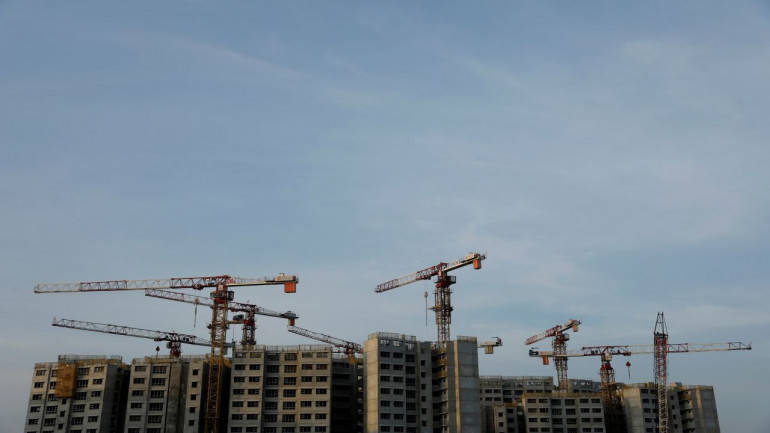The recommendations are "aimed at reducing the impact of GST on the end-consumer and simplifying the compliance requirements of the developer.
A GoM panel headed by Gujarat Deputy Chief Minister Nitin Patel wants GST on under-construction residential houses to be lowered to 5 percent from 12 percent and 3 percent in case of affordable housing category. It has recommended that in both cases, input tax credit cannot be claimed.
Real estate experts said it may definitely bring down the cost for homebuyers (from 8 per cent to 3 per cent for affordable and from 12 per cent to 5 per cent for general category) who were not being able to avail of the benefit of input tax credit paid by the developer as most non-established real estate developers were not passing on the full benefit to the consumers.
These recommendations may address this issue to a large extent, said real estate experts.
They is also likely to boost demand as a homebuyer will upfront pay 5 per cent or 3 per cent without worrying about getting back the input tax credit, they said.
The recommendations are "aimed at reducing the impact of GST on the end-consumer and simplifying the compliance requirements of the developer. The move is a victory for the home buyers and a huge relief in compliance for developers in smaller towns. These positive intentions should translate in home buyers deterred from home purchase by 12 or 8 percent GST to now go ahead and buy the property of their choice. GST exemption to benefits arising from land would be a big boost to slum rehabilitation and affordable housing. The growth in volume of housing sales which we shall soon see would add to the advantages of GST regime and spur real estate led economic growth," said Jaxay Shah, national president, CREDAI.
This should result in increased off-take in under construction homes, said Niranjan Hiranandani, co-founder and MD, Hiranandani Group, adding it is likely to lower the total cost of a house.
Reduction in GST rate from 12 to 5 and 8 to 3 (for affordable housing) will result in lowering the amount payable to buy a home. Consider the 12 per cent tax being levied, which was very high and inflationary. It resulted in many a buyer delaying the home purchase till Occupation Certificate was received.
Effectively, for a homebuyer, 5 per cent GST without ITC is definitely lower than 12 per cent GST with ITC. Secondly, for affordable housing, a similar reduction from 8 per cent to three per cent will translate into a lower GST rate, as also lower total cost of a home, he said.
Thus, a Rs 10 lakh affordable house on which 8 percent GST was levied cost Rs 10.8 lakh earlier in case the builder did not pass on the input tax credit to the buyer. It cost much less in case the buyer availed of the ITC input. Now, with input tax credit done away with, the same house will cost the buyer Rs 10.3 lakh.
Tax consultants, however, say that whether opting for lower rate is beneficial or not for the contractor would depend upon his input taxes.
"Lower GST rate by way of composition definitely sounds attractive. However, in absence of input tax credit on such lower rate, a proper input credit loss vs. lower rate analysis would need to be done to see if the overall tax cost actually comes down," said Harpreet Singh, partner, Indirect Tax, KPMG.
To illustrate with an example, a contractor may have higher output tax liability calculated at the current rate of 12 percent (let’s say Rs 12), but he may also have input tax credit on account of taxes paid on cement, steel etc. (say Rs 10). In this case he simply pays Rs 2 (ie 12 less 10) to the government. However in case of composition scheme with a lower rate of 5 percent without input tax credit, the same contractor may end up paying higher tax of Rs 5 without any deduction.
Therefore, whether opting for lower rate is beneficial or not for the contractor would depend upon his input taxes. In case the contractor incurs a loss on account of this new scheme, he may pass it on to the buyer by increasing the base price, said tax experts.
It is perhaps due to this reason that some real estate developers are of the opinion that the cost of housing is likely to go up.
"Although I understand the political compulsions for the same, this reduction in the GST rate will probably result in an increase in price for the customer as input credit is no longer available," said Rohit Poddar, managing director - Poddar Housing and Development Ltd.
The Finance Ministry has time and again asked real estate dealers to pass on GST rate cut benefits to homebuyers but to no avail.
In order to ensure that the benefits reach the ultimate buyers, the Centre in December 2018 started questioning the developers/builders who were not passing on the benefit of reduced rates and additional input tax credit by triggering anti-profiteering measures.
It clarified that homebuyers of real estate properties will not have to pay GST if they purchase a fully constructed property after the issue of completion certificate. It has also asked builders to reduce prices of properties by passing on the benefit of a lower GST rate.
The government’s note in December 2018 appeared to be an outcome of anti-profiteering complaints against some builders, after it was brought to its notice that some builders/contractors are not passing on the benefit of lower tax burden to homebuyers.
"The potential homebuyers feel they are not getting benefited under GST. Certain proposals have come before the Council and the law and fitment committee will look into the matter. There was a total consensus that something needs to be done," then Finance Minister Arun Jaitley had said in December.
Currently, GST)is levied at 12 per cent on payments made for under-construction property or ready-to-move-in flats where completion certificate has not been issued at the time of sale. And it is 8 per cent for affordable housing. However, GST is not levied on buyers of real estate properties for which completion certificate has been issued at the time of sale.
In case of affordable housing projects like Jawaharlal Nehru National Urban Renewal Mission, Rajiv Awas Yojana, Pradhan Mantri Awas Yojana or any other housing schemes of state governments, GST is levied at 8 per cent, which can be adjusted by builders against its accumulated ITC.
The Finance Ministry had in December last year said that for affordable housing projects, after offsetting ITC, the builder or developer in most cases will not be required to pay GST in cash as the builder would have enough ITC in his books of account to pay the output GST.
Prior to GST rollout, under-construction housing projects attracted 4.5 per cent service tax and a value added tax (VAT) of 1-5 per cent depending on the state. Also inputs used in construction attracted 12.5 per cent excise duty in addition to12.5-14.5per cent VAT. Besides, entry tax was also levied on the inputs.
vandana.ramnani@nw18.com















